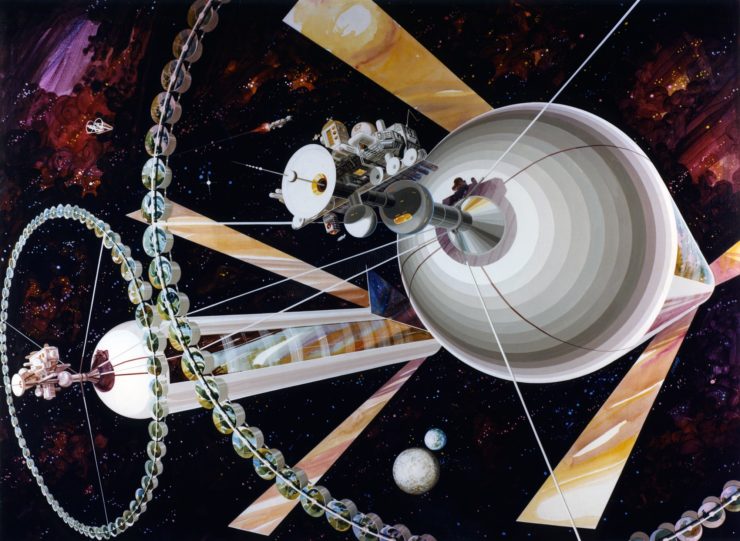We’ve all read about it: after decades of construction, a shiny new generation ship is loaded with a crew of bright-eyed optimists. Once the sun is just another bright star in the sky, mutiny and civil war reduce the crew to ignorant peasants…unless something worse happens. This is a narrative pattern set as early as Murray Leinster’s 1935 “Proxima Centauri,” solidified by Heinlein’s 1941 “Universe,” and embraced by authors ever since: human foibles in the confined space of a generation ship ensure calamity. Ideally not of the sort that leave everyone too dead to be interesting.
But it does not have to go that way! Here are five examples of generation ships that managed to avoid mutiny, civil war, barbarism, and mass cannibalism.
Rite of Passage (1968) by Alexei Panshin
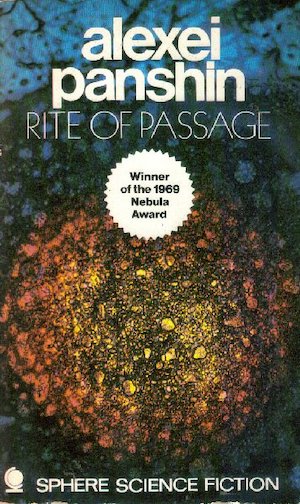
The Ships in Rite are a curious kind of generation ship. They weren’t built; they were excavated. They are vast converted asteroids equipped with faster-than-light drives, designed to transport Earth’s desperate billions to the stars. The original plan seems to have been that once the journey ended, everyone would disembark and the Ships would have been used to establish an industrial base.
The crew of the Ships had what they thought was a better idea: hoard human knowledge for their own and remain in space. The defacto rulers of humanity travel from world to world trading small amounts of the technology they monopolize in exchange for the raw materials they need. It’s not a pleasant system (for the colonies), but it is stable.
Young idealist Mia Havero must first survive her test of adulthood (the rite that gives the book its title) before she can even think of reforming the system into which she was born.
***
Riding the Torch (1974) by Norman Spinrad
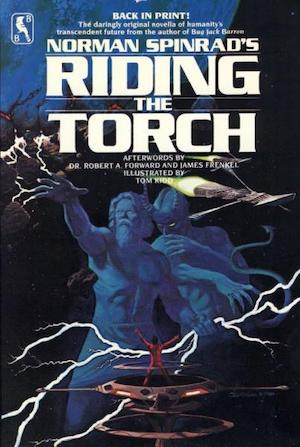
Like the ships in Rite, the mighty Bussard ramjets at the heart of this story were intended as temporary lifeboats to convey the last humans from ruined Earth to new homes. Asyouknowbob, Bussard Ramjets can travel from star to star in just a few years. Unfortunately for humanity as a whole and for artist Jofe D’mahl specifically, despite lifetimes spent looking, none of the stellar systems explored thus far have had habitable worlds.
Instead, humans have been forced to develop increasingly sophisticated technology, therewith to eke out increasing luxurious lives as they travel from system to system. The fleet’s scouts know the truth: habitable worlds are vanishingly rare. Dead Earth might have been the only one. Someone will have to break the news to humanity that the fleet is their permanent home. That someone is Jofe.
***
The Dazzle of Day (1998) by Molly Gloss
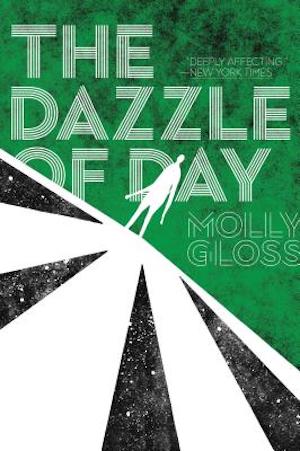
A former space station equipped with vast solar sails, the Dusty Miller takes almost two centuries to reach its extrasolar destination—long enough for any number of horrific social or physical setbacks! Alas, the Dusty Miller’s long voyage was orchestrated by Quakers. The Quakers have been frustrated by an Earth society that resists reform and set out on a journey that will take lifetimes.
Everything keeps working. Not only are the Quakers relentlessly reasonable people, their customs allow them to face disagreements directly and resolve them peaceably. These peculiar arrangements suffice to get the ship across the light years and ensure that their response to the forbidding exoplanet that awaits them is a constructive one.
***
An Unkindness of Ghosts (2017) by Rivers Solomon
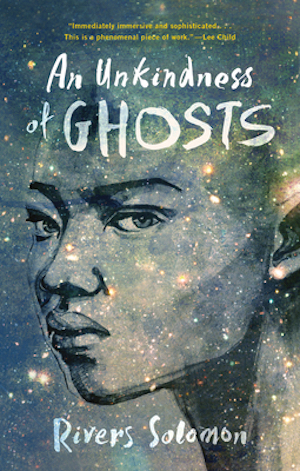
Like Dusty Miller’s creators, the founders who set Matilda on its way had clearly defined mechanisms by which they hoped to ensure their culture’s survival. Unfortunately for protagonist Aster, Matilda’s rulers are patriarchal racists whose purpose is keep their collective boot firmly on the throats of anyone who isn’t white and unambiguously male. They’ve brought a captive population, so that they have someone to dominate.
Aster is brilliant but, since she’s not male and not white, her intelligence only permits her to understand the cage into which she was born. There is no prison so inescapable as a starship in the gulfs of space. Nothing for it but to use her profound intelligence to help her fellow slaves. Or so it seems…
In fact, there’s a mystery on starship Matilda, one that its rulers will never solve but that Aster might.
***
Escaping Exodus (2019) by Nicky Drayden
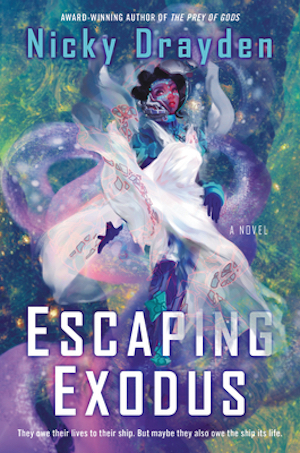
Seske’s ancestors set out across interstellar gulfs to find a new home far from the Solar System. Alas, no New Earth awaited at their destination. Unable to disembark from their aging ships, the colonists settled for exploiting the resource their new home did have: vast space-dwelling beings. This arrangement is slowly fatal to the beasts and offers only a narrow margin of survival for the humans. Nor is it clear that the rigidly hierarchal society Seske will someday lead has done better than to trade immediate death for a lingering one. The lifespan of the beasts her ship infests drops with each beast; the humans may be trapped in a cycle of diminishing returns. Impending extinction is a complete buzzkill for Seske’s already troubled romance with the socially inappropriate Adalla.
Granted, this isn’t a happy ending to the voyage, but at least the humans haven’t reverted to barbarism, as one might have expected…
***
If experience teaches me anything, it’s that for every example I can think of, you folks can think of twenty. Have at it in the comments below.
In the words of Wikipedia editor TexasAndroid, prolific book reviewer and perennial Darwin Award nominee James Davis Nicoll is of “questionable notability.” His work has appeared in Publishers Weekly and Romantic Times as well as on his own websites, James Nicoll Reviews and Young People Read Old SFF (where he is assisted by editor Karen Lofstrom and web person Adrienne L. Travis). He is a four-time finalist for the Best Fan Writer Hugo Award and is surprisingly flammable.










